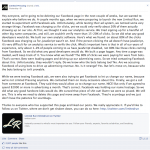Facebook Ad Click Fraud
So what’s going on with Facebook and these crazy click fraud numbers?
Music digital sales platform company Limited Run posted to their Facebook page some interesting findings that call into question the legitimacy of Facebook’s advertising products.

From their original post:
“A couple months ago, when we were preparing to launch the new Limited Run, we started to experiment with Facebook ads. Unfortunately, while testing their ad system, we noticed some very strange things. Facebook was charging us for clicks, yet we could only verify about 20% of them actually showing up on our site.”

Definitely a strange occurrence, but after verifying the statistics with a host of other analytics services and getting the same output, Limited Run decided to build their own analytics software that could effectively track more information about user behavior.
What they found with their custom analytics software was that roughly 80% of their Facebook ad clicks came from people not using Javascript. That explains why the analytics services weren’t verifying the clicks, but looking over their own stats, Limited Run estimated that only 1-2% of their website users have Javascript disabled.
That’s a big discrepancy; so Limited Run took it a step further to confirm their suspicions, building a page logger that kept track of page loads and user behavior. It found that the 80% of clicks with disabled Javascript were from bots. They were paying for fraudulent Facebook ad clicks.
Short of accusing Facebook of the fraudulent activity (it could after all be coming from a crafty competitor in charge of the bots) they got in contact with Facebook and received no reply until posting the entire story to their Facebook Page. While Google figured out how to identify fraudulent AdWords clicks using a variety of methods early on, Facebook is struggling to minimise the effect of fraudulent accounts, of which there could be up to 50 million.
Unless you’re always checking your Analytics, exploring your traffic and seeing how users interact with your page, then you may want to do some homework and explore how your Facebook ad clicks match up with actual visitors to your site. If you find anything amiss, leave us a comment below with your findings or send us an email to [email protected] and we’ll take a closer look at the numbers!

Jim’s been here for a while, you know who he is.


